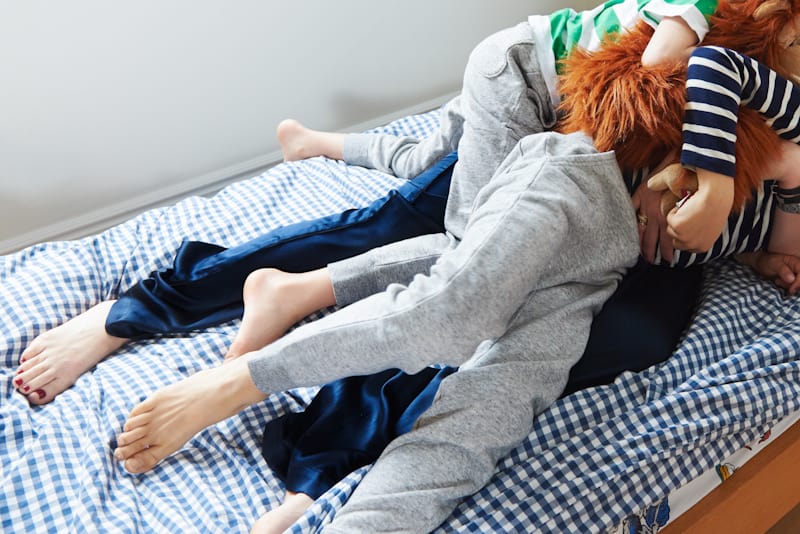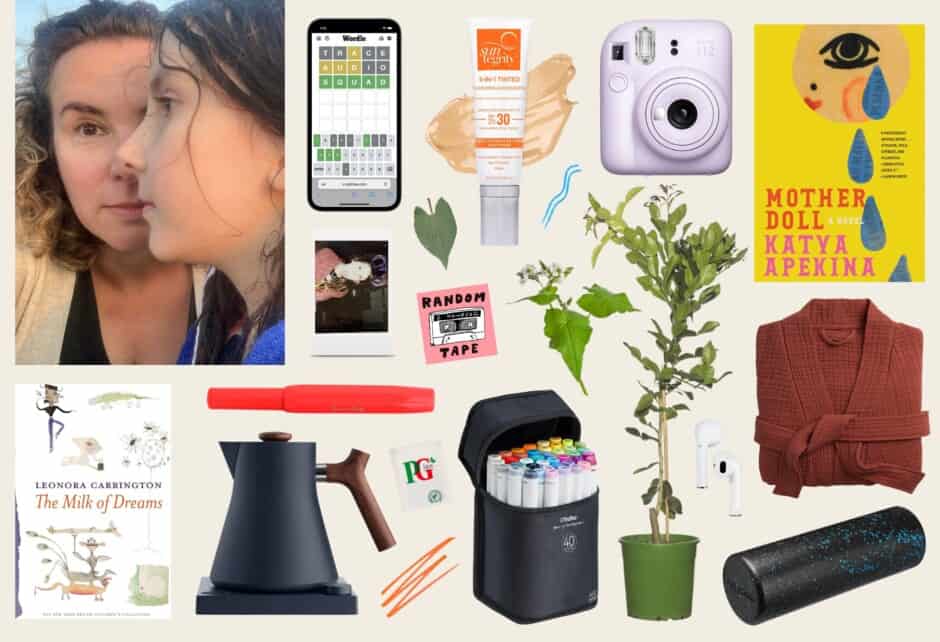
Do You Lie About Co-Sleeping? If So, You’re Not Alone
Written by Katie Hintz-Zambrano
Photography by Araks Yeramyan, Photographed by Maria del Rio
The sleep habits of both babies and children is one of those topics that folks begin discussing—and having strong opinions about—even before they have children, with the practice of co-sleeping and bed-sharing amongst the more hot button issues. While sharing a bed with a parent is popular in many countries around the world (it’s practiced widely in southern Europe, Asia, Africa, and Central and South America), cultural acceptance for co-sleeping has not caught on in the United States.
One major reason—especially during the baby days—is the fear around SIDS, or Sudden Infant Death Syndrome, which claims the lives of 3,700 U.S. babies a year. While there are a variety of factors that contribute to SIDS (which is still quite shrouded in mystery), The American Academy of Pediatrics has made a universal recommendation against bed-sharing, and advises “that infants sleep in the parents’ room, close to the parents’ bed, but on a separate surface designed for infants, ideally for the first year of life, but at least for the first 6 months.”
A recent piece on NPR, however, is questioning these guidelines, explaining that earlier studies on SIDS “lumped together all types of bed-sharing, including when babies were put in very dangerous circumstances, such as sleeping next to a parent who was drinking, doing drugs or smoking. The studies also included babies who slept with a parent on a sofa, not a bed,” explains SIDS researcher Peter Blair, whom NPR interviewed. “In these cases, the evidence is strong and clear. Parents who drink or do drugs shouldn’t be sleeping with their babies because they could roll over onto their child. Babies who are born premature or whose parents smoke shouldn’t sleep in the parents’ bed because of potential respiratory problems. Suffocation can also happen when babies sleep on sofas because babies can be trapped between a parent and the cushions.”
The NPR piece argues that each baby’s risk to SIDS is very personal. It explains that when a healthy, full-term baby with a normal birth weight, whose mother does not smoke or drink, bed-shares with its mother (not on a sofa), the baby’s SIDS risk changes from 1 in 46,000 to 1 in 16,400 (still a lower chance than being struck by lightning).
Meanwhile, a baby with higher “background risk” is at much greater danger once you add bed-sharing into the picture. A premature baby with a younger mother, whose parents smoke and drink, starts out with a SIDS risk of 1 in 1,500. If that baby is also bed-sharing, his or her risk is now 1 in 150. (To put this stat in perspective, this same baby’s chance of developing a peanut allergy is 1 in 50, according to NPR). Poverty and race is also connected to SIDS risk.
As NPR points out, if parents had a better idea of their baby’s personalized risk, due to a variety of factors, the U.S. parents who are currently bed-sharing with their infants (roughly 24% in 2015, up from 6% in 1993) wouldn’t have to hide the fact that they are doing so, and could instead be educated about the safest methods.
Of course, co-sleeping—and lying about co-sleeping—doesn’t stop in infancy. Because of the murky medical guidelines around SIDS, combined with the cultural stigma around bed-sharing in the U.S., many parents of children at a variety of ages have started to conceal their co-sleeping practices, says Susan Stewart, a family sociologist at Iowa State University and author of the 2017 book/study Co‑Sleeping: Parents, Children, and Musical Beds. Stewart interviewed 51 parents (mothers and fathers with children up to 13-years-old) for her research, with half of the parents admitting that they lie about or hide the fact that they bed-share when talking to friends, extended family, and pediatricians, for fear of being judged.
“The main theme of my book is guilt,” explains Stewart. “And the study that really sparked my interest in this topic was from Colombia University, which studied children who bed-shared, and the effects of bed-sharing once they were toddlers when it came to their socio-emotional development. They found that co-sleeping had zero effect. But what was really telling was the flurry of media and responses after this study, and lots of people saying that they do co-sleep, but they hadn’t told anyone until now. After that, I started digging into the research and talking to friends and realized it could be a really cool study.”
While at least a third of the parents Stewart studied were co-sleeping by choice, the other two-thirds “slid” into the practice. “Contemporary parents are exhausted. Everyone is working and there’s a great pressure to produce the perfect child. A lot of the decision to co-sleep was parents just wanting to get sleep,” says Stewart. “Many parents didn’t want to be co-sleeping, but the pattern had established itself. And they didn’t have the energy to set up a plan to get out of it.”
According to Stewart’s study, the pros of bed-sharing and co-sleeping include cuddling and lowering cortisol (the stress hormone) in both the child and the parents, facilitating breast-feeding, increasing family bonding, quality time, and attachment. The cons include restless kids and parents getting smacked, kicked, or pushed out of bed, parents being forced into sleeping apart, fear of producing a spoiled/needy child, and not knowing how to get out of the co-sleeping arrangement. (Desperate parents take note: Stewart’s research has shown that most children will naturally start to phase out out of co-sleeping and bed-sharing around their tween years.)
The sex life of the parents, Stewart found, was not a huge concern. “I asked the couples about intimacy, and what they were telling me is that they find other ways,” she explains. “There’s more modern thinking about sexual norms and one parent said they had a midwife who shared with them the saying ‘co-sleepers do it in the kitchen.’ Overall, they were looking at co-sleeping as a short-term sacrifice for long-term gain. And a lot of these parents probably wouldn’t be having that much sex anyways. They have little kids and they’re exhausted.”
For the parents that did tell others about their co-sleeping habits, “they only told a few, if any, friends or family because of the stigma,” says Stewart. “SIDS looms large and [for older kids] there is this idea of spoiling your children and producing a needy child. It was really incredible the things people would say once they found out the parents were bed-sharing. The problem there [especially with with infants] is that if you aren’t able to tell your doctor or others, you don’t get the education you need to sleep with your child safely.” (Stewart recommends the books Three In A Bed by Deborah Jackson and Sleeping With Your Baby by James McKenna for more in-depth advice on safe sleeping habits).
The overall stigma with co-sleeping and bed-sharing in the U.S., says Stewart, is tied to the increasingly “medicalized and expert-ized” nature of American parenting. “We put a lot of faith in science. It includes pregnancy, child birth, and early parenting,” she says. “We read a million books on parenting, and they’re written by doctors.” Another aspect is the American concept of independence. “There’s a worry that if you coddle your child, then they’re not going to be able to help themselves. And that idea starts in infancy,” she explains. “Parents instinctually hear that their child is in distress and want to attend to their child, but they feel guilty bringing their child into their bed, because they’re not ‘supposed’ to do that. But they also feel guilty not soothing their child. They’re stuck in this situation and there is no way out. Anything you do is going to produce stress and guilt.”
With the sleep habits of families viewed as a largely underreported (but often all-consuming) private matter, we’d love to hear from you! Do you co-sleep with your infant or child? If so, do you ever feel the need to hide it from your doctors, friends, or family? Drop us a comment below!
Share this story



